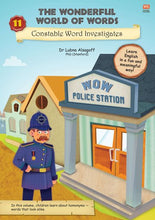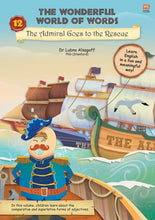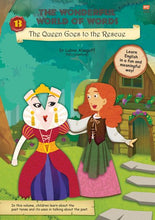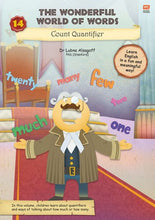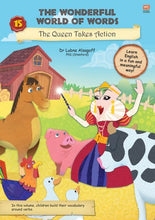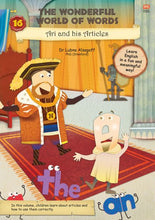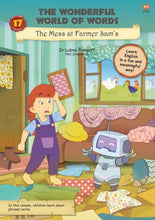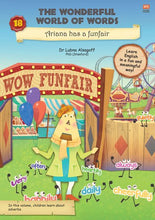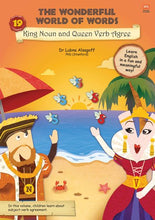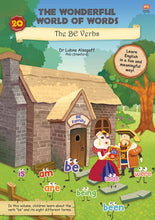
Welcome to the Wonderful World of Words (WOW). This 20-part series of books aims to help children learn English grammar systematically and progressively, in a fun and meaningful way, through stories. Children will be able to understand how grammar works through the exciting tales of the characters from WOW Kingdom and Forest. The stories also help children learn vocabulary that is integrated with grammar, so they can use words accurately in sentences and help improve their writing.
Volumes 1–10 are suitable for children who are just starting to learn English, with topics that cover basic grammar skills, from nouns and verbs to pronouns and adverbs.
Volumes 11–20 are suitable for children who have completed Volumes 1–10 and have grasped the basics of grammar. They are now prepared to learn more concepts such as the past tense, action verbs, phrasal verbs and subject-verb-agreement.
Volume 11 – Constable Word Investigates In this volume, children learn about homonyms – words that look alike. Such words can cause confusion for learners, and the stories in the volume help children understand the importance of looking at the context when learning.
Volume 12 - The Admiral Goes to the Rescue In this volume, children learn about the comparative and superlative forms of adjectives. They not only learn the grammar rules of how these forms are constructed, but more importantly, they learn about such forms within the context of stories to help them use these forms more fluently in sentences.
Volume 13 – The Queen Goes to the Rescue In this volume, children learn about the past tense and its uses in talking about the past. What is particularly important is that the past tense is taught in relation to narratives (stories) which help children improve their use of tenses in writing. Children also learn about the many different ways the past tense is formed, as well as the irregular past tenses.
Volume 14 – Count Quantifier In this volume, children learn about quantifiers and ways of talking about how much or how many. Rather than list the complicated rules, children explore the uses of the various quantifiers through the stories and examples.
Volume 15 – The Queen Takes Action In this volume, children build their vocabulary around verbs. Through the stories, children learn the different ways to describe speaking and movement. They learn how actions can be described more vividly and how verbs are associated with emotions as well as different animals. The skills learnt in this volume will help children enrich their writing through better use of grammar and vocabulary.
Volume 16 – Ari and His Articles In this volume, children learn about articles and how to use them correctly. The rules are explained through stories and there are games and recipes that children can try.
Volume 17 – The Mess at Farmer Sam’s In this volume, children learn about phrasal verbs. Through the stories, they learn important rules about phrasal verbs that are otherwise difficult to teach explicitly.
Volume 18 - In this volume, children learn about adverbs – how many of them are formed, and how some adjectives can look like adverbs.
Volume 19 - In this volume, children learn about subject verb agreement. They learn how the rules work with simple nouns, and also learn how to match the singular or plural verbs to longer noun phrases.
Volume 20 In this volume, children learn about the verb ‘be’ and its eight different forms. They learn how important ‘be’ is in making sentences and helping verbs make the different tenses.










